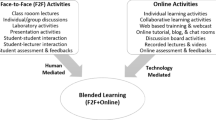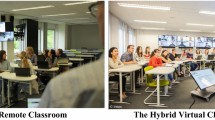Abstract
Technology enhanced learning (TEL) is increasingly influencing university education, mainly in overcoming disadvantages of direct instruction teaching approaches, and encouraging creativity, problem solving and critical thinking in student-centered, interactive learning environments. In this paper, experiences from object-oriented programming (OOP) courses that are taught in three institutions from three different European countries are presented and compared. The courses are based on Java and are delivered in the second year of studies, after students have attended an introductory programming course. The emphasis is given on TEL approaches and accompanying tools and services, focusing mainly on Learning Management Systems (LMS). Our students completed an appropriate questionnaire to evaluate the importance and utilization of TEL services that are used or planned to be used at the programming courses. The results of statistical analysis of collected data show that students from all three institutional groups consider organizational services provided by TEL tools as much or very much important in their education, while communicational services are rarely used. Using non-parametric statistical tests we studied the similarities and differences in perceived importance of TEL services among students from different institutional groups.
Similar content being viewed by others
References
Basioudis, I. G., De Lange, P., Suwardy, T., & Wells, P. (2012). Accounting students’ perceptions of a learning management system: an international comparison. Accounting Research Journal, 25(2), 72–86.
Ben-Ari, M., Bednarik, R., Levy, R. B. B., Ebel, G., Moreno, A., Myller, N., & Sutinen, E. (2011). A decade of research and development on program animation: the Jeliot experience. Journal of Visual Languages and Computing, 22(5), 375–384.
Bennedsen, J., & Schulte, C. (2007). What does “objects-first” mean? An international study of teachers’ perceptions of objects-first. In Lister, R., and Simon (Eds.), Proceedings of Seventh Baltic Sea Conference on Computing Education Research (Koli Calling 2007), Koli National Park, Finland (pp. 21–29). Conferences in Research and Pratctive in Information Technology, Volume 88. Australian Computer Society.
Bergin, J., Stehlik, M., Roberts, J., & Pattis, R. (1997). Karel++- A gentle introduction to the art of object-oriented programming (2nd ed.). New York: Wiley.
Brilliant, S., & Wiseman, T. R. (1996). The first programming paradigm and language dilemma. In K. J. Klee (Ed.), Proceedings of the twenty-seventh SIGCSE technical symposium on computer science education(SIGCSE ‘96) (pp. 338–342). New York, NY, USA: ACM. doi:10.1145/236452.236572.
Brusilovsky, P., Calabrese, E., Hvorecky, J., Kouchnirenko, A., & Miller, P. (1998). Mini-languages: a way to learn programming principles. Education and Information Technologies, 2(1), 65–83.
Cronbach, L. J. (1951). Coefficient alpha and the internal structure of tests. Psychometrika, 16(3), 297–334.
Dierbach, C. (2014). Python as a first programming language. Journal of Computing Sciences in Colleges, 29(6), 153–154.
Emelyanova, N., & Voronina, E. (2014). Introducing a learning management system at a Russian University: students’ and teachers’ perceptions. The International Review of Research in Open and Distributed Learning, 15(1), 272–289. doi:10.19173/irrodl.v15i1.1701.
Erceg-Hurn, D. M., & Mirosevich, V. M. (2008). Modern robust statistical methods: an easy way to maximize the accuracy and power of your research. American Psychologist, 63(7), 591–601.
Feller, W. (1948). On the Kolmogorov-Smirnov limit theorems for empirical distributions. The Annals of Mathematical Statistics, 19(2), 177–189.
Govender, I., & Govender, D. W. (2010). An exploratory study: the effectiveness of a learning management system (LMS) in the delivery of a face-to-face programming course. In Welsh, F., Baralt, J., and Callaos, N. (Eds.), International Conference on Education, Training and Informatics: ICETI 2010, Orlando, USA. http://www.iiis.org/CDs2010/CD2010IMC/ICETI_2010/PapersPdf/EB937FE.pdf. Accessed 5 Sept 2016.
Ivanović, M., & Pitner, T. (2011). Technology-enhanced learning for java programming: duo cum faciunt idem, non Est idem. ACM Inroads, 2(1), 55–63.
Ivanović, M., Pribela, I., Vesin, B., & Budimac, Z. (2008). Multifunctional environment for e-learning purposes. Novi Sad J. Math, 38(2), 153–170.
Ivanović, M., Xinogalos, S., & Komlenov, Ž. (2011). Usage of technology enhanced educational tools for delivering programming courses. International Journal of Emerging Technologies in Learning, 6(4), 23–30.
Ivanović, M., Xinogalos, S., Pitner, T., & Savić, M. (2015). Different aspects of delivering programming courses - multinational experiences. In Badica, C., and Manoupoulos, Y. (Eds.), Proceedings of the 7th Balkan Conference on Informatics Conference (BCI ‘15), Craiova, Romania (Article No. 37). ACM International Conference Proceeding Series, Volume 01001. ACM New York, NY, USA. doi:10.1145/2801081.2801085.
Klobas, J. E., & McGill, T. J. (2010). The role of involvement in learning management system success. Journal of Computing in Higher Education, 22(2), 114–134.
Kölling, M., Quig, B., Patterson, A., & Rosenberg, J. (2003). The BlueJ system and its pedagogy. Journal of Computer Science Education, 13(4), 249–268.
Komlenov, Ž., Budimac, Z., & Ivanović, M. (2010). Introducing adaptivity features to a regular learning management system to support creation of advanced elessons. Informatics in Education Journal, 9(1), 63–80.
Kruskal, W. H., & Wallis, W. A. (1952). Use of ranks in one-criterion variance analysis. Journal of the American Statistical Association, 47, 583–261.
Lahtinen, E., Ala-Mutka, K., & Jarvinen, H. (2005). A Study of Difficulties of Novice Programmers. In Cunha, J., Fleischman, W., Proulx, V. K., and Lourenço, J. (Eds.), Proceedings of 10th Annual SIGCSE Conference on Innovation and Technology in Computer Science Education (ITiCSE '05), Caparica, Portugal (pp. 14–18). ACM New York, NY, USA. doi:10.1145/1067445.1067453.
Lonn, S., & Teasley, S. D. (2009). Saving time or innovating practice: investigating perceptions and uses of learning management systems. Computers & Education, 53(3), 686–694.
Lust, G., Juarez Collazo, N. A., Elen, J., & Clarebout, G. (2012). Content management systems: enriched learning opportunities for all? Computers in Human Behavior, 28(3), 795–808.
Malliarakis, C., Satratzemi, M., & Xinogalos, S. (2016). CMX: the effects of an educational MMORPG on learning and teaching computer programming. IEEE Transactions on Learning Technologies. doi:10.1109/TLT.2016.2556666.
Mann, H. B., & Whitney, D. R. (1947). On a test of whether one of two random variables is stochastically larger than the other. The Annals of Mathematical Statistics, 18(1), 50–60.
Naveh, G., Tubin, D., & Pliskin, N. (2010). Student LMS use and satisfaction in academic institutions: the organizational perspective. The Internet and Higher Education, 13(3), 127–133.
Pears, A., Seidman, S., Malmi, L., Mannila, L., Adams, E., Bennedsen, J., Devlin, M., & Paterson, J. (2007). A survey of literature on the teaching of introductory programming. ACM SIGCSE Bulletin, 39(4), 204–223.
Pribela, I., Ivanović, M., & Budimac, Z. (2009). Svetovid – interactive development and submission system with prevention of academic collusion in computer programming. British Journal of Educational Technology, 40(6), 1076–1093.
Rößling, G., Joy, M., Moreno, A., Radenski, A., Malmi, L., Kerren, A., et al. (2008). Enhancing learning management systems to better support computer science education. ACM SIGCSE Bulletin, 40(4), 142–166.
Sanders, D., & Dorn, B. (2003). Jeroo: a tool for introducing object-oriented programming. ACM SIGCSE Bulletin, 35(1), 201–204.
Selim, H. M. (2007). Critical success factors for e-learning acceptance: confirmatory factor models. Computers & Education, 49, 396–413.
Sun, P., Tsai, J. R., Finger, G., Chen, Y., & Yeh, D. (2008). What drives a successful e-learning? An empirical investigation of the critical factors influencing learner satisfaction. Computers & Education, 50(4), 1183–1202.
Thota, N., & Whitfield, R. (2009). Use of CALMS to enrich learning in introductory programming courses. In Kong, S.C., Ogata, H., Arnseth, H.C., Chan, C.K.K., Hirashima, T., Klett, F., Lee, J.H.M., Liu, C.C., Looi, C.K., Milrad, M., Mitrovic, A., Nakabayashi, K., Wong, S.L., Yang, S.J.H. (Eds.), Proceedings of the 17th International Conference on Computers in Education (pp. 970–974). Hong Kong: Asia-Pacific Society for Computers in Education.
Tsompanoudi, D., Satratzemi, M., & Xinogalos, S. (2016). Evaluating the effects of scripted distributed pair programming on students performance and participation. IEEE Transactions on Education, 59(1), 24–31. doi:10.1109/TE.2015.2419192.
Verpoorten, D., Glahn, C., Kravcik, M., Ternier, S., & Specht, M. (2009). Personalisation of learning in virtual learning environments. In Cress, U., Dimitrova, V., and Specht, M. (Eds), Proceedings of the 4th European Conference on Technology Enhanced Learning: Learning in the Synergy of Multiple Disciplines (EC-TEL ‘09), Nice, France (pp. 52–66). Lecture Notes in Computer Science, Volume 5794. Springer Berlin Heidelberg. doi:10.1007/978-3-642-04636-0_7.
Xinogalos, S. (2015). Object oriented design and programming: an investigation of novices’ conceptions on objects and classes. ACM Transactions on Computing Education, 15(3) Article 13, 21. doi:10.1145/2700519.
Xinogalos, S. (2016). Designing and deploying programming courses: strategies, tools, difficulties and pedagogy. In Education and Information Technologies, Vol. 21, Issue 3, pp. 559–588. New York: Springer Sciece + Business Media 2014. doi: 10.1007/s10639–015–9433-1.
Xinogalos, S. & Satratzemi, M. (2004). Introducing Novices to Programming: a review of Teaching Approaches and Educational Tools. In Malpisca, F. (Ed.), Proceedings of the 2nd International Conference on Education and Information Systems, Technologies and Applications (EISTA 2004), Orlando, Florida, USA, July 21–25, Vol. 2 (pp. 60–65). IIIS International Institute of Informatics and Systemics.
Xinogalos, S., Satratzemi, M., & Dagdilelis, V. (2006). An introduction to object-oriented programming with a didactic microworld: ObjectKarel. Computers & Education, 47(2), 148–171.
Xinogalos, S., Satratzemi, M. & Dagdilelis, V. (2007). Redesigning an OOP course based on BlueJ. In Spector, J.M., Sampson, D.G., Okamoto, T., Kinshuk, Cerri, S.A., Ueno, M., Kashihara, A. (Eds.), Proceedings of the 7th IEEE International Conference on Advanced Learning Technologies (IEEE ICALT 2007), 18–20 July 2007, Niigata, Japan (pp. 660–664). IEEE Computer Society. doi:10.1109/ICALT.2007.214.
Author information
Authors and Affiliations
Corresponding author
Rights and permissions
About this article
Cite this article
Ivanović, M., Xinogalos, S., Pitner, T. et al. Technology enhanced learning in programming courses – international perspective. Educ Inf Technol 22, 2981–3003 (2017). https://doi.org/10.1007/s10639-016-9565-y
Received:
Accepted:
Published:
Issue Date:
DOI: https://doi.org/10.1007/s10639-016-9565-y




